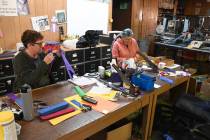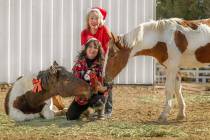Living with polio is about determination
This time, you overdid it.
You were feeling fine — feeling great, in fact — so you pushed yourself to just past your limit. Now you’re paying for it. Your head hurts, your shoulders scream, your knees feel like they’re broken, and your feet are killing you.
What you wouldn’t give to lie down for a week or so. But, as you’ll see in the new book “Limping Through Life” by Jerry Apps, there are some things that you just have to work past. …
Twelve-year-old Jerry Apps figured that he was just plain tired.
And no wonder — he’d spent that January day sledding with his friends, followed by a hearty supper, barn chores, and helping his father shovel a path through the snow from house to barnyard. It was well past 8 p.m. when Apps tried to do homework, but he could barely stay awake.
The next morning, he felt worse — he had a sore throat and his leg hurt “like the dickens.” Like most farm kids in the 1940s, he was used to cuts, scrapes, and minor pain but this was bad. His mother kept him home from school.
It would be weeks before Apps would return to his one-room schoolhouse.
For nearly a decade, post-World War II, Americans lived in fear of an epidemic that “dashed hopes … generated near terror” and caused “panic in some communities.” In Wisconsin alone, some 60,000 cases were reported in 1952. A vaccine for the disease wouldn’t be available until 1955 — but until that time, polio “dramatically changed” young lives.
One of them was Jerry Apps’.
His parents were told that Apps wouldn’t walk again, but doctors never said he couldn’t drive a tractor — so later that spring, Apps’ father put his son out to field. Doctors also never said Apps couldn’t play baseball, so teachers encouraged him to hit the diamond. They never said he wouldn’t ride a bike, and that’s how Apps later got to high school, almost five miles from his parents’ farm. And they never said he wouldn’t serve in the armed forces, so Apps was a proud ROTC member who almost went to Korea. …
Let me say this, straight up: you’ll never whine about being sick again, once you’ve read “Limping Through Life.”
At the outset, author Jerry Apps’ story is one that “old-timers” can appreciate, especially if they farmed back before electricity and TV came to rural America . They’ll appreciate a trip down Memory Lane to times past — but for Boomer readers, that lack of amenities isn’t the jaw-dropper here.
What’s astounding is that Apps’ parents and other elders instinctively seemed to know how to help him regain his mobility, despite a grim prognosis. Apps seems nonplussed about that incredible resourcefulness, as if it was just another thing on the farm — a practical attitude that, mixed with humility, is a sure winner.
I daresay that this isn’t a book for younger readers, but Boomers, polio survivors, and long-time farmers will truly enjoy it. If that’s you, then read “Limping Through Life.” You’ll be glad you did it.
“Limping Through Life: A Farm Boy’s Polio Memoir” by Jerry Apps c.2013, Wisconsin Historical Society Press $22.95 / higher in Canada 238 pages
















